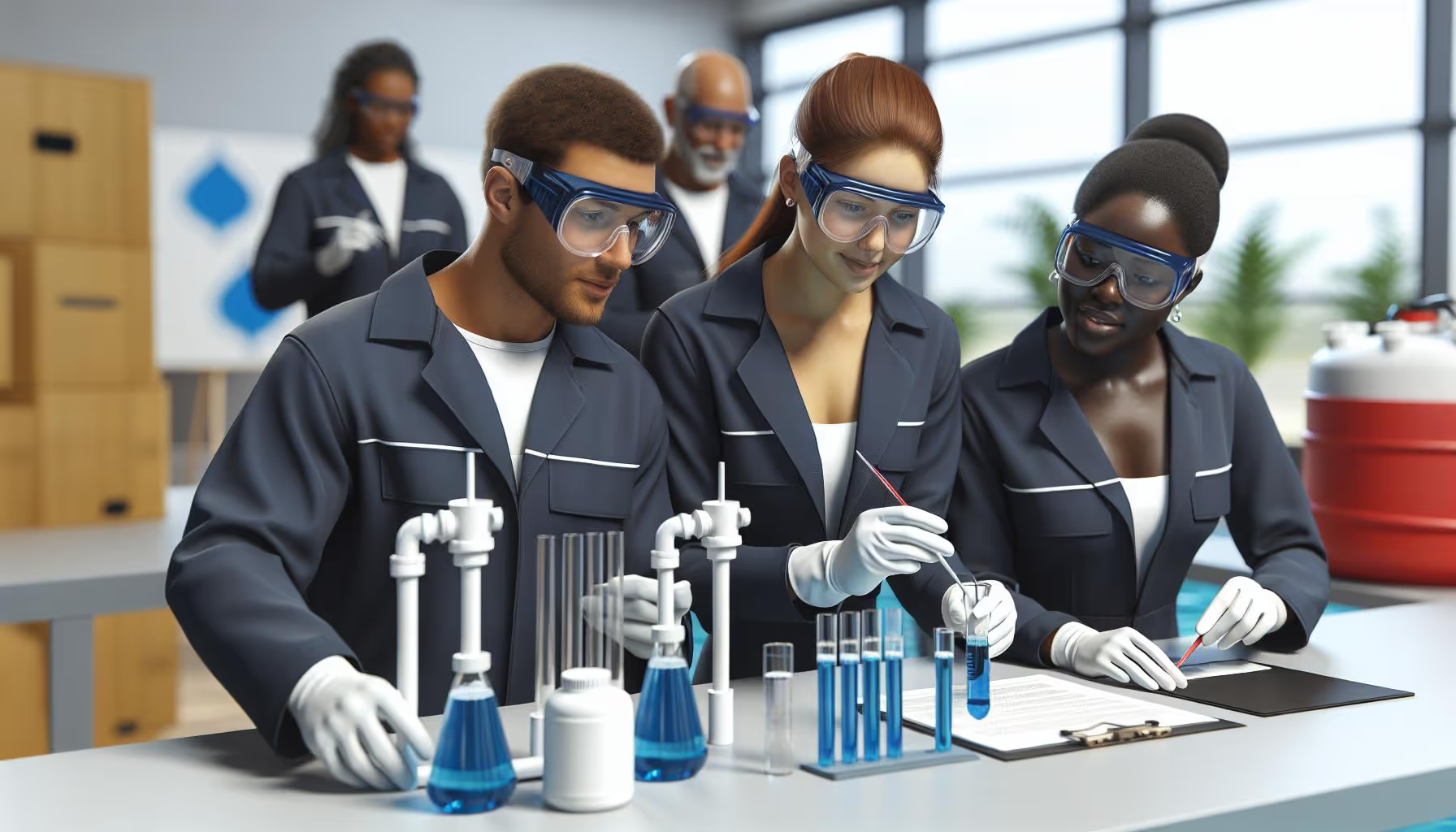Key Takeaways
- Crucial Role of Water Chemistry: Understanding pool water chemistry is vital, as nearly 70% of pool service issues result from improper water balance.
- Benefits of Technician Training: Proper training enhances technicians' abilities to maintain water balance, reduces costly repairs, and boosts customer satisfaction.
- Hands-On Training and Resources: Practical experience, online courses, and engaging tools like visual aids can significantly improve technicians' understanding and confidence in handling water chemistry.
- Effective Use of Technology: Implementing field service management software allows technicians to track chemical data and optimize service delivery, leading to quicker responses and better customer interactions.
- Routine Testing Importance: Regular water chemistry testing and customer education on maintenance are crucial best practices for ensuring a safe and enjoyable pool experience.
- Community and Collaboration: Fostering a supportive training environment encourages knowledge sharing among technicians, enhancing service quality and fostering customer trust.
In the world of pool maintenance, understanding water chemistry is crucial. Did you know that nearly 70% of pool service issues stem from improper water balance? This statistic highlights the importance of training our technicians effectively. By equipping them with the right knowledge, we can ensure safe and balanced service delivery, ultimately leading to happier customers and fewer costly repairs.
Training our technicians in pool water chemistry doesn't just enhance their skills; it also fosters confidence in their ability to manage complex water issues. With the right approach, we can transform our teams into experts who can tackle everything from pH levels to sanitizer types. Let’s explore the most effective ways to empower our technicians and elevate our service standards.
Importance of Pool Water Chemistry Training
Understanding pool water chemistry is crucial for maintaining safety and balance in our services. With nearly 70% of service issues linked to incorrect water balance, effective training for our technicians plays a key role in enhancing service quality.
Benefits of Proper Training
Proper training in pool water chemistry leads to significant advantages. Trained technicians handle water balance efficiently, which reduces costly repairs and enhances customer satisfaction. Increased knowledge allows them to address common chemical issues like pH levels and chlorine concentration confidently.
Training programs can incorporate field service automation tools, which streamline operations. Utilizing service business software, technicians can easily track chemical data and schedule maintenance. This use of mobile field service apps reduces time spent on tasks, letting us focus more on customer engagement and service quality.
Let's think about it: how often have you left a conversation feeling confused about the pool maintenance process? By educating our team, we make sure every interaction is clear and informative.
Impact on Service Delivery
The impact of water chemistry training on service delivery cannot be overstated. When technicians possess the right skills, they deliver reliable and safe services. This reliability fosters trust within the community, leading to repeat business and referrals.
Using technician scheduling tools helps manage routes efficiently, allowing quick responses to customer needs. Implementing field service management software assists in tracking service requests and chemical treatments in real-time. Our mobile workforce management systems enable technicians to access information immediately, leading to informed decisions on-site.
Imagine pulling up to a pool service appointment and seeing a technician that looks ready for anything. That confidence stems from proper training. The more equipped our team is to handle diverse scenarios, the more seamless the service experience becomes. Let's share stories within our community about how well-managed pool services lead to happier customers. What experiences have you had with technician training or service delivery that made a difference?
Key Concepts in Pool Water Chemistry

A strong grasp of pool water chemistry is vital for delivering safe and balanced services. Here are essential concepts that every technician should understand.
Understanding pH Levels
pH levels measure how acidic or basic the water is, impacting swimmer comfort and equipment longevity. A pH range of 7.2 to 7.8 is ideal. When it dips below 7.2, water becomes acidic, leading to skin and eye irritation. When above 7.8, the water might become cloudy and reduce sanitizer efficiency. By regularly monitoring and adjusting pH levels, technicians can prevent service issues and enhance customer experiences. We can make it easier by employing technician management software to track pH levels efficiently.
The Role of Alkalinity
Total alkalinity acts as a buffer for pH, helping stabilize fluctuations. Maintaining a range of 80 to 120 parts per million (ppm) prevents drastic pH shifts. If alkalinity is too low, we can face rapid and abrupt changes that complicate water balancing. Conversely, high alkalinity can create cloudy water and make pH adjustments difficult. Regular testing and adjustments simplify this process, allowing for smooth service delivery. Utilizing service dispatch software can boost efficiency by optimizing the scheduling of water tests and chemical treatments.
Sanitizers and Their Functions
Sanitizers kill harmful bacteria and keep pool water safe. Common options include chlorine, bromine, and salt systems. Chlorine remains the most popular choice due to its effectiveness and low cost. A minimum free chlorine level of 1-3 ppm safeguards against pathogens. Use field service automation tools to track sanitizer levels, ensuring compliance with safety standards. This proactive approach not only protects swimmers but also reduces the likelihood of costly repairs down the line. Keeping these sanitization practices in mind fosters a loyal customer base who appreciates the quality of their pool service.
Effective Training Methods

We focus on a variety of effective training methods that empower technicians in pool water chemistry. These methods enhance service delivery and promote customer satisfaction.
Hands-On Training Approaches
Hands-on training helps technicians get practical experience with pool water chemistry. By working directly with water testing kits and balancing chemicals, they build confidence and competence. We can create real-life simulations, giving technicians the opportunity to troubleshoot common chemical issues. Real-world practice leads to better retention of knowledge. Plus, it fosters teamwork as technicians learn from each other's experiences. Consider scheduling regular training sessions for the team, and watch skills blossom.
Online Courses and Resources
Online courses offer flexible learning options for technicians. They can navigate through various topics at their own pace, from understanding pH levels to managing sanitizer types. Many platforms provide certifications that can boost technician credentials. We can compile a list of recommended online resources and encourage our team to explore new materials. This approach feels less rigid and more engaging. Plus, who doesn't love learning in their PJs while sipping coffee?
Utilizing Visual Aids and Interactive Tools
Visual aids and interactive tools make training more engaging and easier to comprehend. Using charts, infographics, and videos can simplify complex concepts like total alkalinity and chemical reactions. We might even organize fun workshops where technicians use tablet-based apps to track their learning and progress. Incorporating gamification elements keeps everyone excited to improve their skills. After all, who knew pool chemistry could be so colorful? Engaging technology helps us form a closer-knit community while enhancing knowledge retention.
Best Practices for Technicians

Training technicians in pool water chemistry helps in delivering balanced and safe service. Incorporating best practices fosters a strong community of skilled professionals dedicated to high-quality pool maintenance.
Routine Testing and Maintenance
Routine testing and maintenance play a crucial role in keeping pool water safe and enjoyable. We can implement daily checks on pH levels, alkalinity, and sanitizer concentrations. Regular adjustments prevent bigger issues down the road. For example, if a technician notices a pH that's outside the ideal range of 7.2 to 7.8, they can act quickly to correct it. Using field service management software streamlines these tasks, allowing us to track water chemistry results and scheduling efficiently. By encouraging technicians to share their findings and tips, we create a collaborative atmosphere, enhancing our service quality and community trust.
Customer Education on Water Safety
Customer education on water safety plays an integral role in our service delivery. We can provide homeowners with essential knowledge on maintaining their pool water balance. Simple tips like testing water weekly or understanding the importance of sanitizer levels can help prevent problems. Sharing checklists or guides via our homeowner service app fosters engagement. We could even host fun, informative workshops showcasing water safety best practices. Who knows, we might find ourselves laughing over some hilarious pool stories while learning! Engaged customers are more likely to maintain a clean and safe environment, reducing the chances of service calls.
Developing a Training Schedule
Developing a training schedule benefits all parties involved. Regular training sessions keep technicians updated with the latest practices and tools in pool water chemistry. We can utilize job scheduling software for technicians to organize these sessions efficiently. Consider including hands-on training, online courses, and even gamified learning experiences to cater to different preferences. Frequent interactions and sharing of experiences foster a sense of community among technicians. Scheduling these sessions consistently allows us to reinforce knowledge and adapt to customer needs swiftly, all while building a supportive network.
With these best practices, we can empower our technicians and elevate our service delivery standards.
Conclusion
Training our technicians in pool water chemistry isn't just beneficial; it's essential for delivering exceptional service. By equipping them with the knowledge and skills to manage water balance effectively, we ensure safer swimming environments and happier customers.
Investing in hands-on training and modern learning methods fosters a culture of confidence and competence among our team. This commitment not only enhances our service quality but also builds trust within our community.
As we prioritize ongoing education and effective management tools, we position ourselves as leaders in the industry. Together, we can create a standard of excellence that keeps our customers coming back and referring us to others. With the right training, we’re not just maintaining pools; we’re cultivating relationships and ensuring long-term satisfaction.
Frequently Asked Questions
What is the importance of water chemistry in pool maintenance?
Understanding water chemistry is crucial in pool maintenance as nearly 70% of service issues come from improper water balance. A well-maintained chemical balance ensures swimmer comfort, prolongs equipment life, and minimizes repair costs.
How can technician training improve pool service?
Effective technician training enhances skills and boosts confidence in managing complex water issues. This leads to better service delivery, increased customer satisfaction, and promotes trust, resulting in repeat business and referrals.
What should technicians monitor regularly in pool water?
Technicians should regularly monitor pH levels, total alkalinity, and sanitizer concentrations. Maintaining pH between 7.2 to 7.8 enhances comfort, while proper alkalinity stabilizes pH. Tracking sanitizer levels ensures compliance with safety standards.
What training methods are effective for pool technicians?
Hands-on training, online courses, and interactive tools are effective methods for training pool technicians. These approaches provide practical experience and flexibility, helping technicians grasp complex concepts and gain necessary certifications.
How can service management software help pool technicians?
Service management software streamlines operations by enabling efficient scheduling, task management, and communication. This allows technicians to optimize their workflows, ensuring high-quality service delivery and quicker responses to customer needs.
What best practices should pool technicians follow?
Pool technicians should conduct routine water testing, maintain proper chemical balances, and educate customers about water safety. Regular maintenance checks can prevent larger issues, enhancing the overall swimming experience.
How can customer education improve pool service satisfaction?
Educating customers about pool water safety empowers them to take an active role in maintenance. Workshops and informational sessions can foster a sense of ownership, leading to better care and satisfaction.
Why is proper pH and alkalinity important?
Maintaining the right pH and alkalinity is vital for swimmer comfort, equipment longevity, and preventing corrosion or scaling. Regular monitoring helps stabilize water chemistry and avoids costly repairs.






